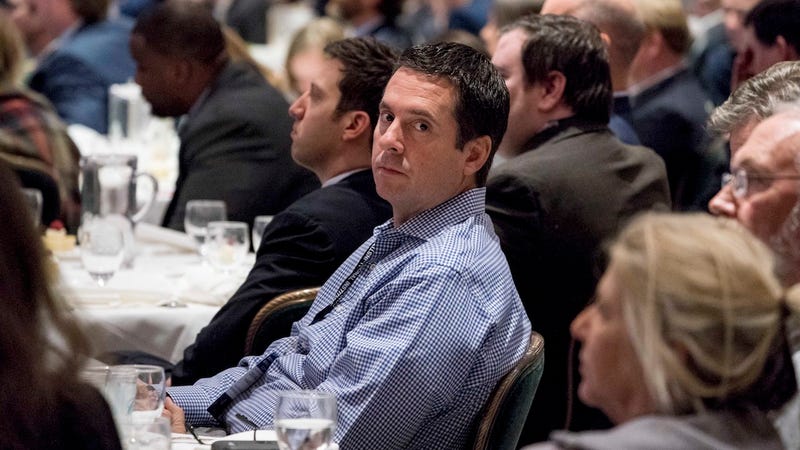
Rep. Devin Nunes, the godfather of disappointment, released his memo on Friday, capping off another chapter in the life of the California congressman and chairman of the House Intelligence Committee who exists solely to ingratiate himself to President Trump. The memo is positioned as some sort of smoking gun that stops just short of claiming the FBI colluded with the Clinton campaign to stop Donald Trump from becoming president. But the central premise around the memo—that a controversial dossier was used to launch a politically motivated FBI investigation into members of the Trump team—is totally contradicted by what the memo actually says.
First, the memo states that the FBI’s FISA warrant for Carter Page—a Trump campaign foreign policy adviser likely only hired because all the not-super-creepy conservative thinkers had boarded the #NeverTrump train—was acquired after the Trump campaign began distancing themselves from Page and referring to him as an “informal adviser” who “does not speak for Mr. Trump or the campaign.”
And there we go. The only date that matters. Confirms that all of this happened *after* Page left the campaign. What a waste of everyone's time this whole episode was. pic.twitter.com/UEQhzSDOtW— Pwn All The Things (@pwnallthethings) 2 Şubat 2018
The memo further indicates that the FISA warrant was granted, in part, due to allegations raised in the dossier authored by former British spy Christopher Steele. It indicates that the FBI would not have pursued the warrant without the dossier and it notes that Steele was not a fan of President Trump. None of this is explosive. And the notion that the Steele dossier alone is enough to convince four judges on the Foreign Intelligence Surveillance Court (FISC) to grant a warrant is patently ridiculous.
The warrant was reauthorized three times, according to the memo, even after the controversy surrounding it exploded in the press. Applications for FISA warrants are rigorous; there’s simply no way the court kept reauthorizing the Page warrant solely based on the dossier.
This #NunesMemo is profoundly unimpressive. It is rife with implicit assumptions but even if every single one of them broke in favor of Nunes and Trump it still is scarcely scandalous given the way the FISA process actually operates.— Mark Stout (@WWIPhD) 2 Şubat 2018
The argument that we should be suspicious of Steele because he didn’t like Trump is a bad one: Should courts only acknowledge information from sources who favor the president? Only people who voted for Donald Trump can testify to character? As far as takes go, this one’s pretty bad. Steele apparently doesn’t like Trump—so what?
Steele’s political leanings might matter politically, but suggesting they matter legally is a big stretch.
The memo claims that the FBI didn’t alert the surveillance court to Steele’s bias. But that point is being strongly refuted by the Democrats, who wrote a memo of their own, which wasn’t released because the Nunes and the Republicans on the House Intelligence Committee prevented it. The FBI, meanwhile, claims the narrative portrayed in the memo is misleading because of “material omissions of fact that fundamentally impact the memo’s accuracy.”
Finally, all the way in the last paragraph, the memo notes that information about Trump campaign adviser George Papadopoulos, who pleaded guilty last October to lying to the FBI, “triggered” the FBI’s counterintelligence investigation into Russia. “There is no evidence of any cooperation or conspiracy between Page and Papadopoulos,” it says. Even if so, references to Papadopoulos seem to undermine the central point Nunes is trying to make: that the investigation into Trump campaign associates stemmed from a dossier written by a guy who apparently didn’t plan on joining one of the president’s golf clubs.
That’s it? Dishonest and misleading memo wrecked the House intel committee, destroyed trust with Intelligence Community, damaged relationship with FISA court, and inexcusably exposed classified investigation of an American citizen. For what? DOJ & FBI must keep doing their jobs.— James Comey (@Comey) 2 Şubat 2018
That members of Congress were able to release information about a classified warrant and for blatantly political purposes is truly startling.
The memo goes on to report that Steele began communicating with members of the press about details contained in the dossier at the instruction of his employer, Fusion GPS. Doing so may have burned his bridges with the FBI, but what this proves otherwise is anyone’s guess.
Are we to believe that if the dossier was *so* central and important to the FISA and it was based on nothing else, a judge -– a human being who watches TV and reads the papers – would have never questioned it and the FBI/DOJ could have just kept "tricking" the court? 🙄— Asha Rangappa (@AshaRangappa_) 2 Şubat 2018
The Republican Party has always prided itself on being the party that demonstrates the utmost respect and loyalty for law enforcement. They kind of fucked that up today.
You can read the memo here, and an annotated version here. But once you do, be warned, you will not get those precious moments of your life back.
source:Gizmodo


Post a Comment